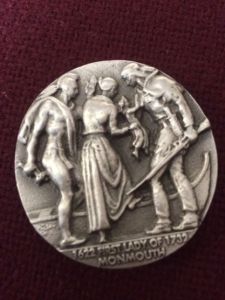 I work on a transcription project for the NEHGS [New England Historical and Genealogical Society.] Our current project includes wills, deeds and town records from early Plymouth New England, basically the records of people who came on the Mayflower. I recently came across a very interesting record about my 10 great grandmother Elizabeth Warren.
I work on a transcription project for the NEHGS [New England Historical and Genealogical Society.] Our current project includes wills, deeds and town records from early Plymouth New England, basically the records of people who came on the Mayflower. I recently came across a very interesting record about my 10 great grandmother Elizabeth Warren.
Elizabeth was the wife of Richard Warren, who had come on the Mayflower. Elizabeth came in 1622 on the ship the “Anne”, and was widowed in 1627, leaving her with 7 children. The story now gets even more interesting. If you have heard that women didn’t have rights in early America, you have heard wrong. The original records prove this, and I have seen examples of women conducting business, buying and selling property, voting, leaving wills etc. In the case of Elizabeth, the Court ruled unanimously that Elizabeth should take the place of her husband Richard as an original Purchaser.
Elizabeth buys and sells property, and is included in the town records for some time. In 1652 she deeded some of her property to her sons-in-law, and her oldest son Nathaniel wasn’t happy. Generally, under English law Nathaniel, as oldest son, would inherit his father’s property, with 1/3 going to his mother during her life, and her 1/3 passing to him upon her death. The fact that she was made an Purchaser in the place of her deceased husband, gave her the same rights as any man in the Colony at the time.
Nathaniel, and his mother-in-law, Jane Collyer, went to court to force her to stop disbursing the property. The court sided with Elizabeth and continued to give her total control over her property. The information was included in the town records, which were witnessed and signed by several men including William Bradford, and Myles Standish. The town records gives the following.
“ by reason whereof many great and sad Differences (sic) were like to arise between the p[a]rties above said [Nathaniel Warren and Jane Collyer] and that the said Mistress Warren and her other children to who she had Deposed some part of her lands to their Discontent [meaning the discontent of Nathaniel and Jane]. . . lastly, the said Nathaniel Warren shall for ever cease all other or further claims suites questions or any molestations or disturbances at any time hereafter concerning the premises but that his said mother, and all her children or any other to whom she hath any way dispensed any lands or shall hereafter (sic) do the same”
In a nutshell -leave Elizabeth Warren alone. The town court decided, again, that Elizabeth had the right to do what she wanted to her property and Nathaniel should quit being a pest and leave her alone. Nathaniel, who had already been deeded some of the property, was left to inherit his remaining share after his mother died. In the mean time she could sell and do business as she wanted to. Elizabeth continued to do as pleased, and she outlived Nathaniel by 6 years. Go to the original records if you can, and you will learn real history.

